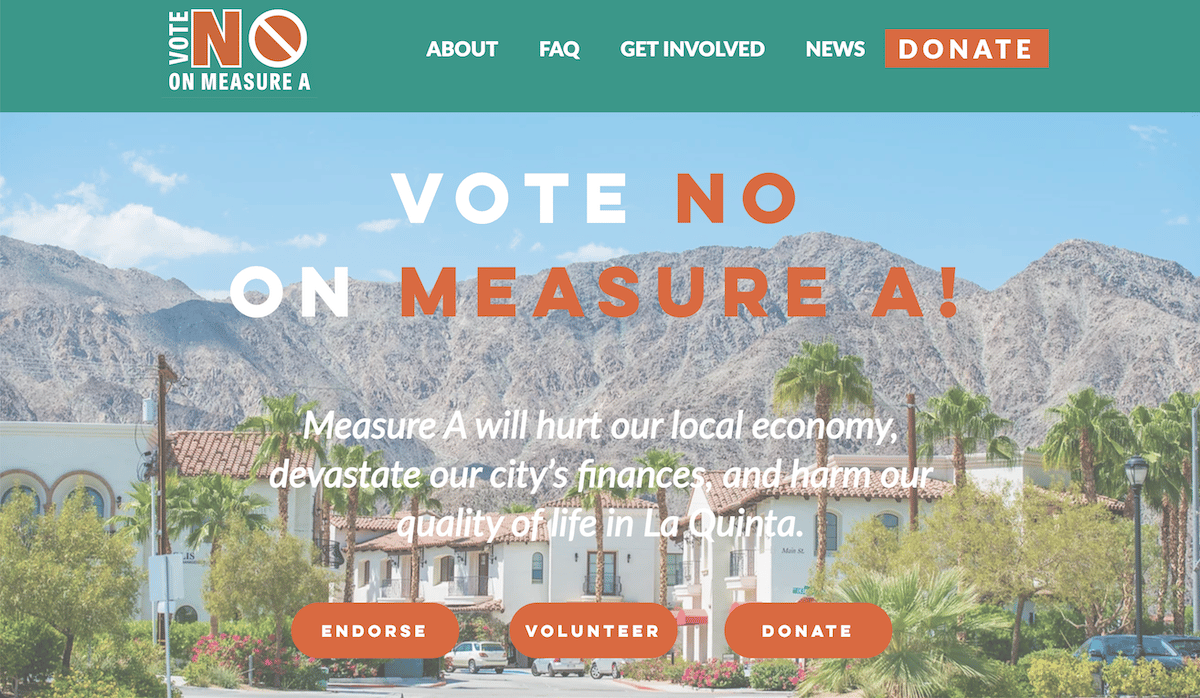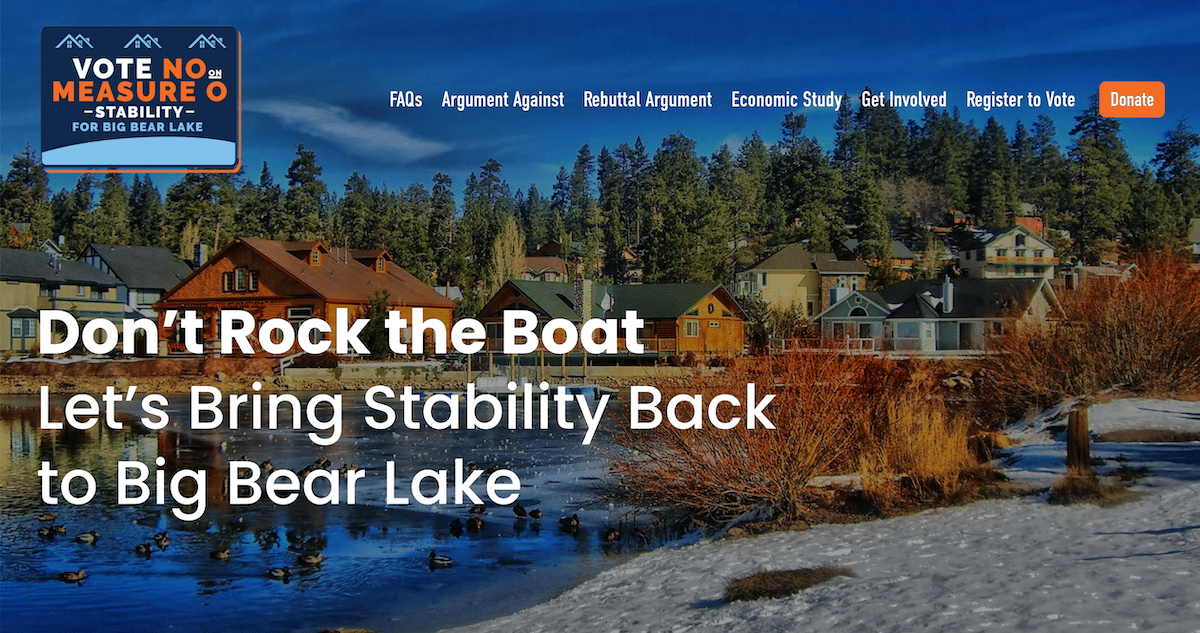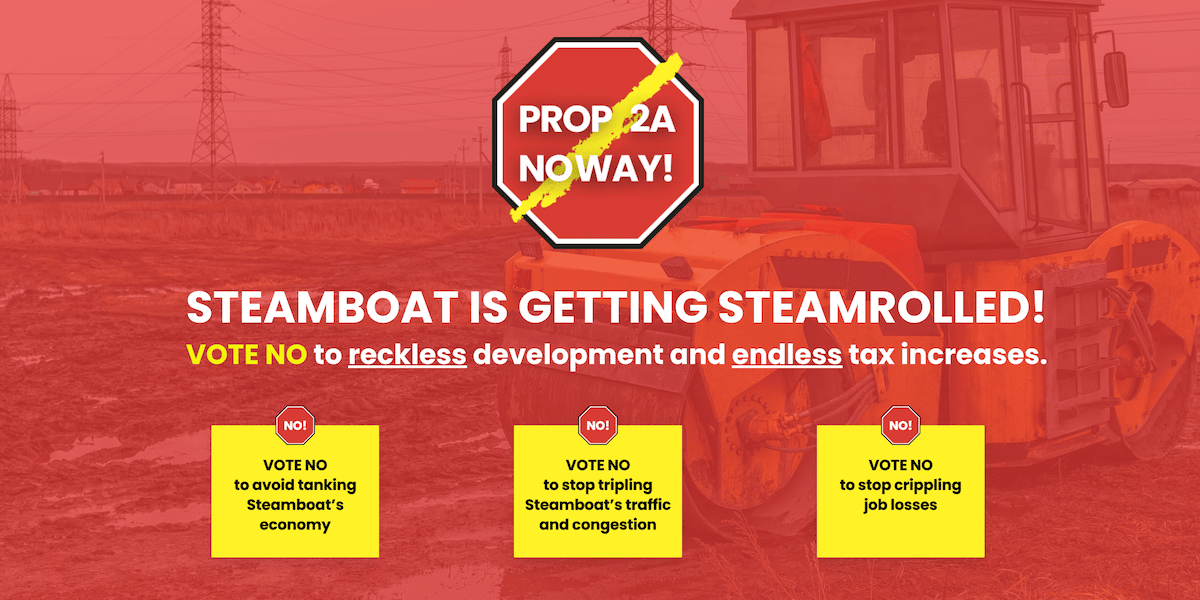Dozens of ballot initiatives on short-term rental regulations ranging from partial bans to tax increases will head to local voters this November.
This year, California and Colorado are hot spots for ballot referendums on STRs with most initiatives seeking to increase incoming revenues from STRs. Colorado’s explosion in STR-related referendums stems from a new state law that allows this kind of tax revenue to go toward affordable housing, child care, and other workforce development.
Meanwhile, in California, some cities are targeting STRs for higher taxes than what hotels, motels, and inns have to pay for their right to do business in their local area.
STR Bans and Caps
La Quinta, California
Measure A, a citizens’ petition in La Quinta in Southern California near Palm Springs, would ban all STRs that are not occupied by the homeowner. A “Yes” vote would phase-out and ban all non-owner-occupied STRs in areas of the city that have been zoned as exempt for STRs by Dec. 31, 2024.
Don Shoftstall, a resident of La Quinta, wrote in an argument in support of Measure A that STRs are disruptive to neighborhoods and remove homes from an already limited supply.
La Quinta, population 37,500, first enacted STR regulations in 2012, and the City Council has amended the regulations multiple times since then, according to City Attorney William Ihrk.
In August 2020, the city passed a moratorium on new STR permits in “non-exempt” residential areas and formalized into code the ban on new permits in non-exempt areas in May 2021.
That ordinance reduced permits in non-exempt areas from 1,037 to 792, or 23.63%, wrote Mayor Pro-Tem Kathleen Fitzpatrick and Councilmember Robert Radi in an argument against Measure A.
Measure A would simply punish rule-abiding permitted STR operators in exempt zones while failing to solve the problem of neighbor complaints against STRs, Fitzpatrick and Radi wrote.
About 66% of all complaints against STRs during La Quinta’s festival season were against unpermitted operators, they noted.
“The city will have insufficient financial resources to enforce the (Measure A) ban,” they added.
In his impartial analysis of Measure A, Ihrk wrote that STRs are a “significant share of the city’s economy.”
In 2021, STR guest spending generated $170 million in business sales, $21.1 million in personal income, 779 jobs, and $9.7 million in local tax revenues, mostly transient occupancy taxes and sales taxes.
If Measure A passes, the inventory of STRs in La Quinta would be reduced from about 1,200 currently to 400 units, Ihrk wrote. Consequently, the city would lose an estimated $100 million in business sales, 445 jobs, $13 million in personal income, and between $6.1 million and $8 million less in local tax revenues, he wrote.
Vacation Rental Owners and Neighbors of La Quinta (VRON-LQ) have launched a “Vote No” campaign against the measure. They have raised about $74,180 for the campaign but continue to seek more donations until they reach the $250,000 mark.
In a letter to the editor in the Desert Sun, Olivier Chaine, board president of VRON-LQ, wrote that the group “believes that tourism and residents can coexist through smart policies and best practices. Through research, open data, community involvement, collaboration, transparency, and ethics, effective policies can be developed that create a win-win for neighbors, renters, businesses, property owners, and the community at large.”
Big Bear Lake, California
In Big Bear Lake, California, voters are considering two ballot referendums aimed at STRs.
Measure P would increase the transient occupancy tax on hotel and vacation rental guests from 8% to 9% in January 2024 and then from 9% to 10% in January 2025.
Meanwhile, Measure O places a cap on the number of STRs in the small tourist town of 5,000 people in San Bernardino County. The cap would limit the number of STRs to a total of 1,500 and limit the number of vacation rental contracts to 30 per year per unit, excluding home-sharing arrangements.
According to AirDNA, Big Bear Lake currently has over 3,300 vacation rental properties, so the cap would cut the number of units by more than 50%.
The Vote No on Measure O campaign funded by Residents for a Better Big Bear has focused on the economic hardship that the cap would bring to local businesses and the small town’s economy. Their website states that the measure would reduce tourism spending by 40%.
An argument against the measure was signed by prominent Big Bear Lake residents, including former Mayor Liz Harris, Debby Sevick who owns the Bear Skins gift shop, a 30-year-old business; and Maria Rojas, owner of Sonora Cantina. They said the measure would leave vacation rentals empty for 10 months out of the year and would have a devastating blow on small businesses such as restaurants, retail stores, and bicycle and ski rentals.
The Vote No on Measure O campaign has a sign-up sheet for volunteers to take yard signs, canvass neighborhoods, host community coffees, make phone calls, and write letters to the editor.
Portland, Maine
The most draconian of these ballot initiatives comes from a petition by the Democratic Socialists of America (DSA) in Portland, Maine. The initiative, titled Question B on the ballot, would restrict STRs to owner- or tenant-occupied properties, including duplexes in which the owner lives in one of the two units.
Maine has a long history of vacation homes and has the highest concentration of them in the country. About one in five houses in Maine are registered as vacation homes – though not necessarily STRs, according to IPX 1031.
The DSA estimates that Question B would convert about 350 STRs to Portland’s long-term rental market. That is nearly 40% of the 900-plus short-term rentals in the City of Portland.
However, many of the owners of these vacation homes would not necessarily long-term rent the properties under an STR ban. The properties would simply stand empty when their owners aren’t using them, said vacation home owner Chuck Radis in an interview with Fox 23 in Maine.
Given the concentration of vacation rental properties in Maine, should the measure pass and other municipalities follow Portland’s lead, STR bans could have an outsized impact on the state.
Taxes Galore
Colorado
Voters will consider general and STR-specific lodging taxes in several cities and counties around Colorado, from Aspen to Steamboat Springs, many of which are designed to generate income for affordable housing projects.
The explosion of STR tax referendums in Colorado this year stems from a new state law, HB 22-1117, that allows lodging tax revenue to be used for affordable housing, child care, and other workforce development.
Steamboat Springs, Colorado
Voters in Steamboat Springs, for example, will consider 2A, a 9% tax on STRs to generate funds for the construction of an affordable housing project in that city. The City Council recently created zoning maps to restrict where STRs are allowed in the city, and the STR tax is the final part of that plan.
If approved by voters, the total taxes on STRs in Steamboat Springs would be 20.4%, one of the highest taxes on STRs in the state, according to Sotheby’s International Realty.
The tax would not apply to hotels and would sunset in 20 years, according to the Steamboat Pilot.
The Steamboat Springs Community Preservation Alliance (SSCPA) is running a campaign, No Way on 2A, against the tax, which they say is too high.
Robin Craigen, vice president of the SSCPA, said the tax would make Steamboat Springs less competitive against resort towns like Vail, which have lower taxes on STRs.
“The tax will be more than double that of Vail who’s our competitor,” Craigen said.
Steamboat Springs is heavily dependent on tourism: About 50% of its economy is tourism, and it yields about $250 million per year in visitor spending, he said. The lodging community has proposed a more moderate tax of 2%.
Aspen, Colorado
Aspen voters will consider an STR tax that ranges from 5% to 10% depending on ownership. Guests at owner-occupied STR properties would be taxed 5% while guests at units owned by investors or second homeowners would face a tax of 10%.
If approved, the tax would go into effect on May 1, 2023, and would generate an estimated $9.14 million in the first year, according to the Aspen Times. The City Council has said that a minimum of 70% of the tax revenue would go to the city’s housing program, and the other 30% could be used for other purposes like city infrastructural improvements, the newspaper reported.
Gordon Ledingham of the Aspen Pitkin County Short-Term Rental Alliance said there is no official opposition campaign against the tax. However, there have been letters to the editor opposing any new taxes.
Summit County, Colorado
Summit County is considering a 2% STR excise tax on all guest stays effective Jan. 1, 2023.
The Summit Alliance of Vacation Rental Managers (SAVRM) is supporting the tax. “We think 2% is a reasonable amount, and if the county is benefitting from us financially we feel they will be more willing to work with us,” said Ashley Kubiszyn, a founding board member of SAVRM.
One of the existing restrictions in Summit County is a limit on the number of nights that vacation rentals can host guests. SAVRM is hopeful that passage of the excise tax will lead to removing that limit on nights, Kubiszyn said.
Around the State
STR taxes are also proposed for the following cities in Colorado:
- Carbondale, CO – 6% excise tax on STR stays to support affordable housing projects, effective
- Centennial, CO – 3.5% tax on short-term lodging, including hotels and STRs
- Dillon, CO – 5% excise tax on STR stays and tripling lodging tax from 2% to 6%
- Dolores County, CO – 2% lodging tax on hotels, STRs, and other transient lodging providers to help fund tourism marketing, child care, and affordable housing
- Eagle County, CO – 2% lodging tax in towns and unincorporated areas where a lodging tax doesn’t already exist. The tax would apply to the town of Gypsum and unincorporated areas of Eagle County, including Beaver Creek and Bachelor Gulch. Vail and other cities in Eagle County already have lodging taxes in place and would not be subject to the county tax, according to Vail Daily.
- Estes Park, Larimer County, CO – 3.5% lodging tax on STRs and other transient lodging providers to go toward solving workforce shortage issues such as child care and housing
- Georgetown, CO – Measure 2A proposes changing the 2% county lodging tax with a 2% town sales tax on lodging to go toward “Tourism, Marketing and Events in addition to providing funding to workforce housing programs, and childcare for residents employed in tourism supported businesses.”
- Gilpin County, CO – 2% lodging tax on STRs, hotels, and other short-term lodging
- Littleton, CO – 5% lodging tax on guests who stay at STRs, hotels, and other transient lodging providers
- Salida City, CO – flat rate STR tax, including a $1,000 annual fee on STR license holders and an occupational lodging tax of up to a maximum of $15 per bedroom per night. Both revenue streams would go toward affordable housing.
California
In California, transient occupancy taxes will be increased in the cities of Santa Monica, Santa Cruz, Yucca Valley, Needles, Millbrae, Alameda, Clovis, and Downey. Santa Monica and Santa Cruz both have proposed higher TOT taxes specifically for STR guests. Hotel, motel and inn guests would pay a lower rate.
- In Santa Monica, the TOT rate would increase from 14% to 15% on hotels and from 14% to 17% on short-term rentals.
- In Santa Cruz, the TOT would increase from 11% to 12% for hotels, motels, and inns and increase to 14% for STRs.
- Measure Q in Inyo County would expand its hotel tax to include STRs at a rate of 12% of the rate charged.






Comments are closed.